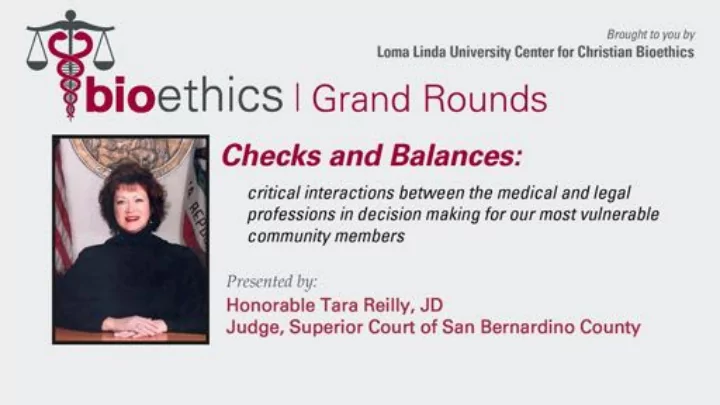

Th The Unbefriended Patient: : 32,000 foot Perspective Some rudimentary legal ground rules:
Due Process: Notice and Opportunity to be heard.
Equal Protection under the law: similarly situated persons should be treated equally and enjoy same rights and protections.
Hippocratic Oath: Begins with an agreement by physicians/practitioners to openly share knowledge with those who follow them for the sake of the profession�And of course� swears the treatments will be used for the benefit of the ill and not for harm.
Ab Abbreviations • CANHR: California Advocates for Nursing Home Reform • CDPH: California Department of Public Health • IDT: Interdisciplinary Team • POLST: Physician Orders for Life Sustaining Treatment • DNR: Do Not Resuscitate • L.P.S.: Lanterman Pertris Short Act • SNF: Skilled Nursing Facility
There are FOUR primary legal constructs that permit a 3 rd party to make medical decisions for another person: 1) Use of various Powers of Attorney including advance health care directives 2) Conservatorships of the person: both probate and L.P.S. 3) Probate Code Section 3200 4)Health & Safety Code 1418.8
REPRESENTED PATIENTS Conservatorship: • A conservatorship is a protective court proceeding. • In a conservatorship, the conservator (a court-appointed fiduciary), manages the personal care of a person who cannot properly provide for their personal needs.
Conservator • Under a conservatorship of the person, the conservator has the �care�, custody, and control: of the Conservatee, including the power to determine where the Conservatee will live. Prob. Code, section 2351-2352.
Medical Decisions Who can make medical decisions in a Conservatorship? • The Conservatee is presumed to have the capacity to make medical decisions unless the court finds, that the Conservatee lacks the capacity to give informed consent.
When Health Care Decisions May be Made by Conservator • Four exceptions to the general rule that the Conservatee retains capacity to give informed consent to medical treatment. Three of the exceptions are by statute: • 1) Emergency situations. • 2) A court order, where the Conservator is given the authority to consent to certain narrowly defined medical treatment, a �single transaction� power� • 3) A court order, where the court grants general medical powers to the Conservator when the Conservatee lacks capacity. • 4) When Conservatee retains legal counsel to give informed consent but the physician or health care provider refuses to accept just the consent of the Conservatee and requires a court order.
Probate Code section 3200 et seq. �������������d� - � unbefriended � persons • A petition may be filed to determine that a patient lacks the capacity to make a health care decision concerning specified treatment for an existing or continuing condition, and further for an order authorizing a designated person to make a health care decision on behalf of the patient.
THE PETITION
THE DOCTOR�S DECLARATION
[Proposed] ORDER
SKILLED NURSING FACILITIES � SNFs Defined: • Skilled nursing facilities provide 24-hour skilled nursing and supportive care to resident individuals whose primary need is for the availability of skilled nursing care on an extended basis. (See Health & Saf. Code, § 1250, subd. (c)(1).) • Intermediate care facilities provide 24-hour inpatient care to individuals who are developmentally disabled or who otherwise do not require continuous skilled nursing care, but have recurring need for skilled nursing supervision and require supportive care. (See id., § 1250, subds. (d), (g) & (h).) From: CANHR, et al., vs. Smith (2019) 37 CA 5 th 814, fn 1.
Ca. Health & Safety Code Section 1418.8 • Enacted in 1992. • Intended to give SNF�s intermediate care facilities means of decision making for incapacitated residents who have no one with legal authority to make healthcare decisions on their behalf. • 1418.8 constitutionality was challenged in CANHR, et al., vs. Smith (2019) 37 CA 5 th 814.
Notice • The SNF/physician must provide notice both orally and in writing to the resident and another competent person whose �interests are aligned with those of the resident� before the recommended intervention may be undertaken. • The notice must include the following information: 1) the fact of the resident has been found to lack capacity and to lack a legal surrogate; 2) the proposed treatment by the attending physician; 3) the fact the IDT will make a decision on the proposed treatment; 4) the resident�s right to have a patient representative participate on the IDT� and 5) the resident�s right to seek judicial review� and • The resident must be given a ���a���ab�� ������������ to seek judicial review after receiving the notice.
IDT Composition • Every IDT must include a patient representative who is unaffiliated with the SNF except in cases of emergency.
End of Life • The 1418.8 process may be used to impose or change a POLST, DNR, or comfort care orders, or to make a decision to provide hospice care to a terminally ill patient. • The process may not be used to make a determination regarding the withdrawal of life support, that decision must be made through a court process. (Id. At pp. 833-835 & 880) • The Court also found that the section 1418.8 process may be used to make decisions related to the administration of antipsychotic medications. (Id. At p� ���� Further, a �patient representative should be designated for each resident determined� to lack capacity �as soon as that determination is made�� �Id� At p� ����
IN IN CONCLUSION...
Recommend
More recommend